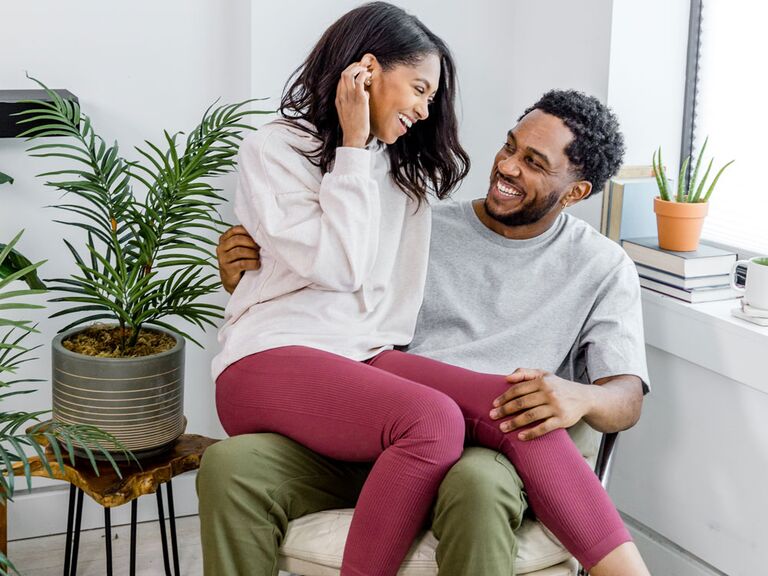Here's What Being in a Healthy Relationship Actually Means
Love is the foundation for any romantic relationship, but that doesn't mean it comes without hard work. While it might sound cliché, having a healthy relationship requires trust, commitment and dedication. But, in 2021, the characteristics of a healthy relationship have taken on entirely new meanings amid the onset of events like the coronavirus pandemic and pivotal social justice movements. Plus, with a newfound focus on the self-love narrative, our "new normal" has readjusted to the current climate. As a result, it impacts nearly every aspect of daily life—especially romantic partnerships.
If you've ever wondered exactly how to have a healthy relationship, we're here to help. We tapped industry experts to break down what a healthy relationship looks like in 2021. They share key signs that indicate the strength of your partnership, as well as practical ways to improve your connection to give you the romance you've always dreamed of having.
In this article:
What Is a Healthy Relationship?
Ultimately, relationships look different for every couple. Your list of non-negotiable characteristics may be different from those of your best friend or a family member. Love takes many forms, and the "right" way to have a relationship is not always black and white. Despite this, there are a few universal qualities of a healthy partnership to look out for.
According to The Knot 2021 Self-Love & Stress Study, which surveyed over 500 women-identifying respondents aged 18-29, the most important signs of a healthy relationship are likely what you'd expect. When asked to list the top four characteristics, 62% chose trust as number one. Communication was listed next, with 58% of respondents ranking it as the second-most important quality, followed by honesty at 46% and respect at 43%. Other descriptions included having fun/enjoying each other's company, commitment, support, having shared values and self-love.
Without the presence of these traits, a relationship won't be in its healthiest form. And no matter what your personal preferences are, having a healthy relationship means being able to fully trust your partner and feel accepted no matter what. "When you're in a healthy relationship, you should feel like your partner is your best friend," says Kimberly Panganiban, LMFT and contributor at Choosing Therapy. "Your relationship should not be a source of stress. You should feel supported emotionally, and it's important to feel like you can open up, express yourself and be who you really are."
Even if you and your partner have different traits and beliefs, you can still have a healthy relationship. What matters most, though, is that you have unwavering support and respect for each other. "We can find romantic partners that have different core values, personality types, or shared interests," says Dr. Meaghan Rice, PsyD, LPC. "But, what defines wholesomeness is being able to look at your partner and say, 'I'm not like you, but you bring out the best version of me by supporting our differences.'"
The Most Common Signs of a Healthy Relationship
So, how do you have a healthy relationship? It takes equal effort from both partners, especially for a long-term union. And, while each person has their own personal set of standards for success, there are a few universal characteristics of a healthy relationship that'll help you determine if your current situation is serving you, which we break down below.
You Prioritize Communication
Our study found that communication was one of the most important factors of a healthy relationship, and experts agree—but what you talk about and how you approach those conversations are just as important. When asked to select the most important topics to discuss with a partner, 67% of respondents said large life decisions (like having children, buying a house, getting a pet, etc.). Relationships issues was the second most-popular option, with 65% saying they're important to talk about. Personal goals and aspirations, family situations and finances/budgeting rounded out the top five most important things to discuss with your partner.
But, even though people know it's important to communicate about these topics, it's not always easy. Our survey found that 26% of respondents said it was stressful to talk about relationship issues, while 24% struggled to talk about stressors, and 21% found it difficult to bring up both family situations and finances/budgeting.
While it might feel awkward to approach a difficult conversation, having the ability to do so is one of the top signs of a healthy relationship—even if you don't always see eye to eye. As a certified Gottman Therapist, Panganiban's work revolves around the studies of Dr. John Gottman, a psychological researcher and clinician who spent over four decades working on divorce prediction and marital stability. "Gottman's research shows that couples who are in a happy relationship can talk about their differences in a way that helps them understand each other better," Panganiban explains. "When you can understand your partner, there's usually a level of acceptance. You get out of a 'right vs. wrong' mentality and can accept that their views are different, which opens up the opportunity to compromise."
She notes that trying to change your partner's views will often result in frustrating—and sometimes unsolvable—disagreements. "This leads to tension and conflict, and eventually couples get gridlocked," she adds. "Oftentimes they're not as polarized as they feel, but that state leads some couples to disconnect and lead parallel lives."
To avoid this, prioritize communication and be open to compromise. "Gottman's research found that all couples have perpetual problems," Panganiban says, which means that they're unlikely to go away over the course of the relationship. "No matter who you're with, you're going to have a set of differences and disagree on some things. The goal is that couples identify them early and determine if they're things they can live with, and compromise on the rest."
You Find New Ways to Connect Emotionally
People often encourage couples to continue to date each other, and for good reason. It's completely possible to keep your relationship in the serendipitous honeymoon phase, even after you've been together for quite some time. In fact, finding new ways to get to know one another is a key way to prioritize the health and longevity of your relationship.
In addition to planning regular date nights without distractions, experts recommend finding new ways to connect emotionally. "I encourage couples to find rituals of connection, which are different points during the day where they can intentionally connect with one another," Panganiban suggests. "It's important to sit down and talk about how you want to be connected on a daily basis in small ways. It doesn't have to be major, but small points of connection can make a big difference."
For some couples, that might mean drinking coffee together in the morning before work or eating dinner together every night. But for others, it could involve watching a TV show regularly, joining a club together, or committing to a hobby you both enjoy. By putting in the effort to consistently make time for each other, your connection will only grow stronger over time.
You're Willing to Compromise on Differences
Conflict is natural for every relationship, especially for those who've been together long-term. And while it's not a bad thing to disagree with your partner, you have to handle your differences with grace and maturity. In fact, the way you handle conflict is a sign of a healthy relationship. "A core piece of understanding a healthy or unhealthy relationship is what happens during conflicts or disagreements," says Panganiban. "Even in times of conflict, couples should have a one-in-five ratio: for every negative moment or feeling, you should be able to identify five positive things that outweigh the negative." She also notes that, while some people expect conflict to result in hurt feelings, that should never be the case. Instead, couples should support each other with positivity and empathy even when working through tough moments. "It's important to listen to each other's emotions and support one another while working through things together," she adds.
Being ready to fight for the health of your relationship is a true sign of a strong, long-lasting connection. "Having a healthy relationship is all about the willingness to align and defend the relationship above all other intruders," Rice explains. "The world puts pressure on relationships all the time, but it's less about the external pressure and more about the internal combat to fight for one another."
You Understand How Your Partner Expresses Emotion
Having a shared level of emotional maturity is one of the top qualities to look for in a romantic partner. Not only will this ensure you and your partner are aligned on values and goals, having a shared sense of emotional maturity will help you express your thoughts and feelings in ways that make sense to the other. "I always encourage people to look for a partner with emotional maturity," says Panganiban. "Having different opinions on how to express emotions can really impact a relationship, and the interactions couples have on a daily basis. Ideally, you want a partner who you can be on the same page with when it comes to expressing emotions."
Rice echoes this sentiment, saying that while your partner doesn't have to understand all of your emotions for a healthy relationship, they should be able to empathize with you. "Emotional reciprocity is an important personality trait to look for in a romantic partner," she explains. "We often want someone that can put themselves in our shoes and feel our pain or happiness enough to support it."
So, even if you and your partner express yourselves differently, it's important to know how to support each other in ways that make sense for your needs. If you're able to do so, you'll create a foundation for a long-lasting and healthy union.
You Both Have Strong Senses of Self-Love
Have you ever been told you need to love yourself before you can love someone else? This common piece of dating advice might sound cliché, but it's valid. According to our study, 79% of respondents agreed that you must love yourself before you love someone else—and experts validate this claim. "There's a big difference in the caliber of relationships with folks that love themselves and folks that have more self-loathing," says Rice. "Though it may seem surprising, our partners have the tendency to either match the self-love or the self-loathing we have for ourselves."
Having a healthy relationship also requires a sense of interdependence from both partners. It's important to foster an individual sense of self-love so that you can fully open yourself to accept love from a partner without developing a sense of dependency on them. "We won't attract someone that loves us in our transparent form if we don't love ourselves," says Rice. "After all, we teach others, especially our most intimate relationships, how to love us in the best possible way. And we only know that information if we have practiced alone."
If you're already in a relationship, talk to your partner about your desire to improve your own sense of self-love. The results will be immensely beneficial for the relationship you have with yourself, as well as your S.O.
























